MidOil and Afrex Negotiation and Conflict Resolution Report Analysis
VerifiedAdded on 2020/04/21
|5
|904
|254
Report
AI Summary
This report analyzes a negotiation and conflict resolution scenario between MidOil, a gas company in Singapore, and Afrex, an oil and gas producer in Africa. The core objective is to assess the strengths, weaknesses, and strategies employed in their business agreement aimed at capturing the Asian global market. The report highlights the positive aspects of the collaboration, such as Afrex's industry leadership and effective marketing, while also identifying limitations like the short timeframe and dependence on current licenses. The report also addresses conflicts arising from differing viewpoints on production field access, oil barrel production targets, and royalty rates. Furthermore, the report offers insights into the negotiation styles used, including informal, direct, and impatient approaches, alongside their implications for future business strategies, providing a comprehensive overview of the negotiation process and its outcomes. The report concludes by reflecting on the lessons learned from the negotiation project.
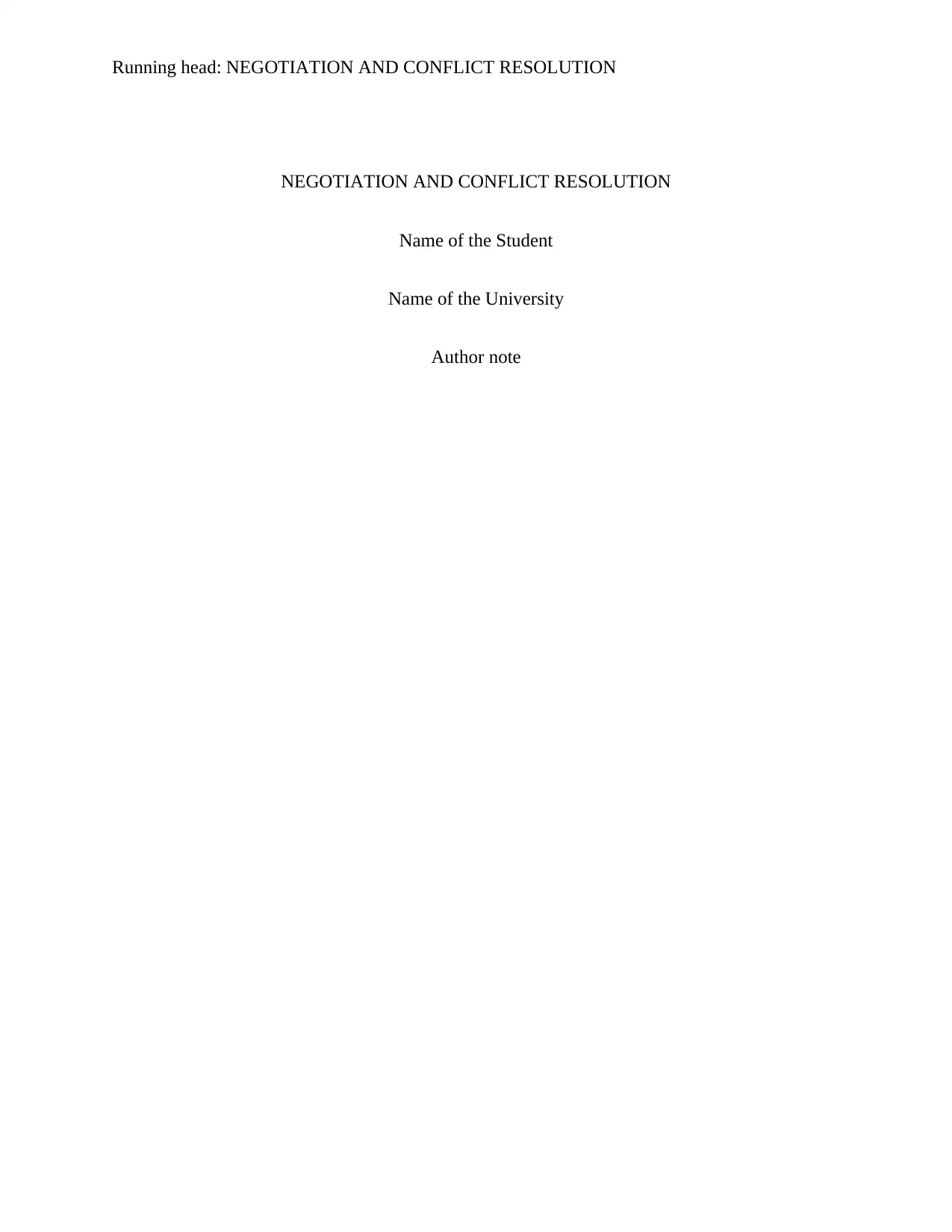
Running head: NEGOTIATION AND CONFLICT RESOLUTION
NEGOTIATION AND CONFLICT RESOLUTION
Name of the Student
Name of the University
Author note
NEGOTIATION AND CONFLICT RESOLUTION
Name of the Student
Name of the University
Author note
Paraphrase This Document
Need a fresh take? Get an instant paraphrase of this document with our AI Paraphraser
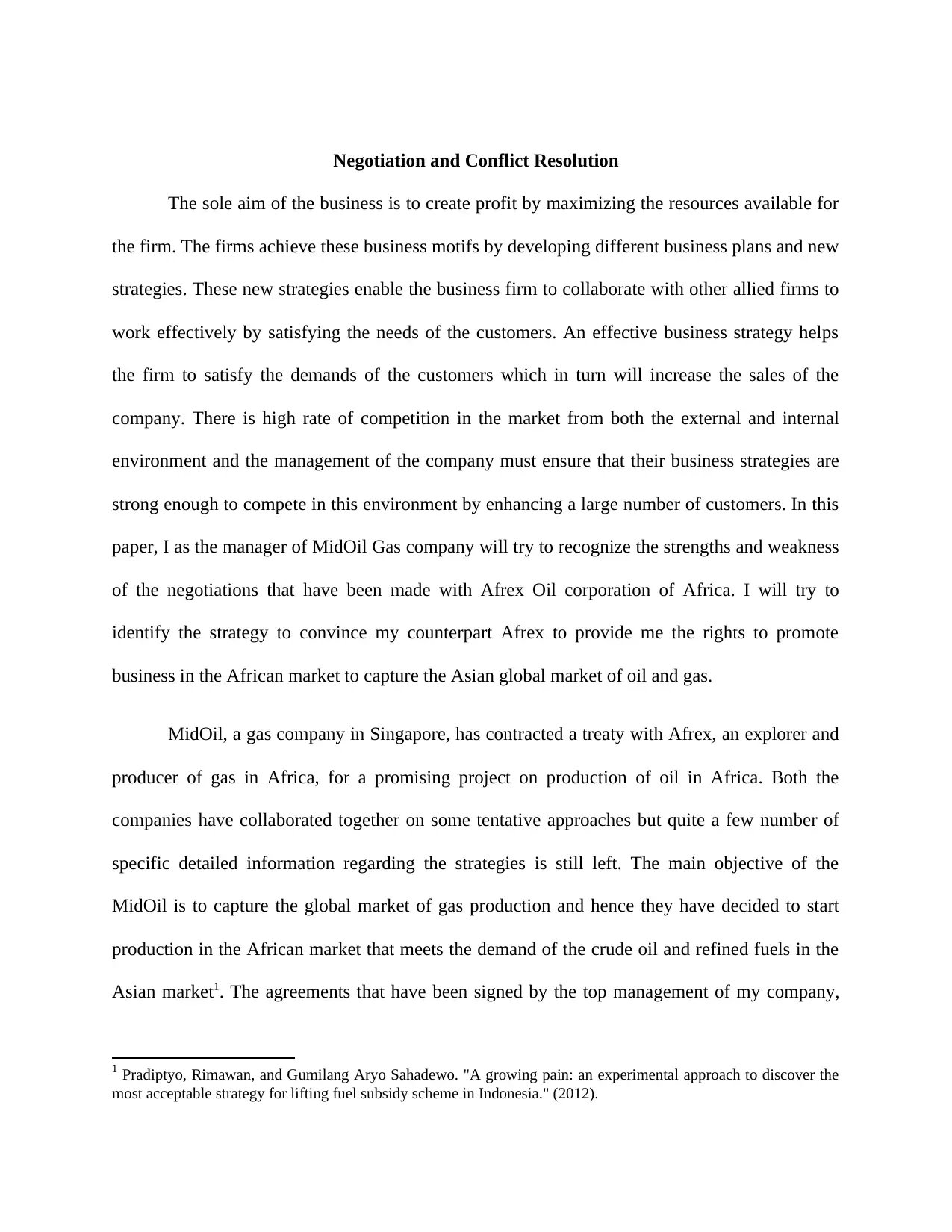
Negotiation and Conflict Resolution
The sole aim of the business is to create profit by maximizing the resources available for
the firm. The firms achieve these business motifs by developing different business plans and new
strategies. These new strategies enable the business firm to collaborate with other allied firms to
work effectively by satisfying the needs of the customers. An effective business strategy helps
the firm to satisfy the demands of the customers which in turn will increase the sales of the
company. There is high rate of competition in the market from both the external and internal
environment and the management of the company must ensure that their business strategies are
strong enough to compete in this environment by enhancing a large number of customers. In this
paper, I as the manager of MidOil Gas company will try to recognize the strengths and weakness
of the negotiations that have been made with Afrex Oil corporation of Africa. I will try to
identify the strategy to convince my counterpart Afrex to provide me the rights to promote
business in the African market to capture the Asian global market of oil and gas.
MidOil, a gas company in Singapore, has contracted a treaty with Afrex, an explorer and
producer of gas in Africa, for a promising project on production of oil in Africa. Both the
companies have collaborated together on some tentative approaches but quite a few number of
specific detailed information regarding the strategies is still left. The main objective of the
MidOil is to capture the global market of gas production and hence they have decided to start
production in the African market that meets the demand of the crude oil and refined fuels in the
Asian market1. The agreements that have been signed by the top management of my company,
1 Pradiptyo, Rimawan, and Gumilang Aryo Sahadewo. "A growing pain: an experimental approach to discover the
most acceptable strategy for lifting fuel subsidy scheme in Indonesia." (2012).
The sole aim of the business is to create profit by maximizing the resources available for
the firm. The firms achieve these business motifs by developing different business plans and new
strategies. These new strategies enable the business firm to collaborate with other allied firms to
work effectively by satisfying the needs of the customers. An effective business strategy helps
the firm to satisfy the demands of the customers which in turn will increase the sales of the
company. There is high rate of competition in the market from both the external and internal
environment and the management of the company must ensure that their business strategies are
strong enough to compete in this environment by enhancing a large number of customers. In this
paper, I as the manager of MidOil Gas company will try to recognize the strengths and weakness
of the negotiations that have been made with Afrex Oil corporation of Africa. I will try to
identify the strategy to convince my counterpart Afrex to provide me the rights to promote
business in the African market to capture the Asian global market of oil and gas.
MidOil, a gas company in Singapore, has contracted a treaty with Afrex, an explorer and
producer of gas in Africa, for a promising project on production of oil in Africa. Both the
companies have collaborated together on some tentative approaches but quite a few number of
specific detailed information regarding the strategies is still left. The main objective of the
MidOil is to capture the global market of gas production and hence they have decided to start
production in the African market that meets the demand of the crude oil and refined fuels in the
Asian market1. The agreements that have been signed by the top management of my company,
1 Pradiptyo, Rimawan, and Gumilang Aryo Sahadewo. "A growing pain: an experimental approach to discover the
most acceptable strategy for lifting fuel subsidy scheme in Indonesia." (2012).
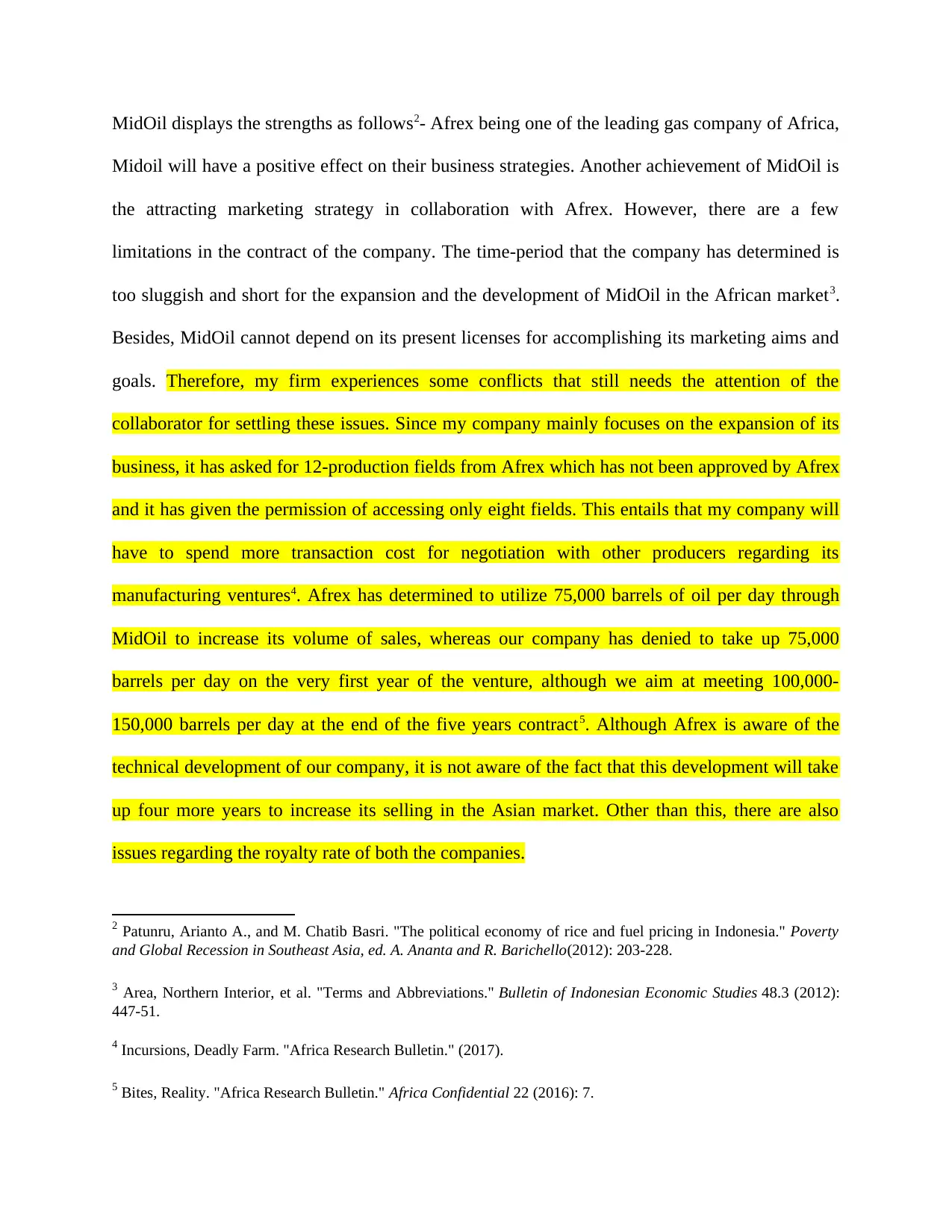
MidOil displays the strengths as follows2- Afrex being one of the leading gas company of Africa,
Midoil will have a positive effect on their business strategies. Another achievement of MidOil is
the attracting marketing strategy in collaboration with Afrex. However, there are a few
limitations in the contract of the company. The time-period that the company has determined is
too sluggish and short for the expansion and the development of MidOil in the African market3.
Besides, MidOil cannot depend on its present licenses for accomplishing its marketing aims and
goals. Therefore, my firm experiences some conflicts that still needs the attention of the
collaborator for settling these issues. Since my company mainly focuses on the expansion of its
business, it has asked for 12-production fields from Afrex which has not been approved by Afrex
and it has given the permission of accessing only eight fields. This entails that my company will
have to spend more transaction cost for negotiation with other producers regarding its
manufacturing ventures4. Afrex has determined to utilize 75,000 barrels of oil per day through
MidOil to increase its volume of sales, whereas our company has denied to take up 75,000
barrels per day on the very first year of the venture, although we aim at meeting 100,000-
150,000 barrels per day at the end of the five years contract5. Although Afrex is aware of the
technical development of our company, it is not aware of the fact that this development will take
up four more years to increase its selling in the Asian market. Other than this, there are also
issues regarding the royalty rate of both the companies.
2 Patunru, Arianto A., and M. Chatib Basri. "The political economy of rice and fuel pricing in Indonesia." Poverty
and Global Recession in Southeast Asia, ed. A. Ananta and R. Barichello(2012): 203-228.
3 Area, Northern Interior, et al. "Terms and Abbreviations." Bulletin of Indonesian Economic Studies 48.3 (2012):
447-51.
4 Incursions, Deadly Farm. "Africa Research Bulletin." (2017).
5 Bites, Reality. "Africa Research Bulletin." Africa Confidential 22 (2016): 7.
Midoil will have a positive effect on their business strategies. Another achievement of MidOil is
the attracting marketing strategy in collaboration with Afrex. However, there are a few
limitations in the contract of the company. The time-period that the company has determined is
too sluggish and short for the expansion and the development of MidOil in the African market3.
Besides, MidOil cannot depend on its present licenses for accomplishing its marketing aims and
goals. Therefore, my firm experiences some conflicts that still needs the attention of the
collaborator for settling these issues. Since my company mainly focuses on the expansion of its
business, it has asked for 12-production fields from Afrex which has not been approved by Afrex
and it has given the permission of accessing only eight fields. This entails that my company will
have to spend more transaction cost for negotiation with other producers regarding its
manufacturing ventures4. Afrex has determined to utilize 75,000 barrels of oil per day through
MidOil to increase its volume of sales, whereas our company has denied to take up 75,000
barrels per day on the very first year of the venture, although we aim at meeting 100,000-
150,000 barrels per day at the end of the five years contract5. Although Afrex is aware of the
technical development of our company, it is not aware of the fact that this development will take
up four more years to increase its selling in the Asian market. Other than this, there are also
issues regarding the royalty rate of both the companies.
2 Patunru, Arianto A., and M. Chatib Basri. "The political economy of rice and fuel pricing in Indonesia." Poverty
and Global Recession in Southeast Asia, ed. A. Ananta and R. Barichello(2012): 203-228.
3 Area, Northern Interior, et al. "Terms and Abbreviations." Bulletin of Indonesian Economic Studies 48.3 (2012):
447-51.
4 Incursions, Deadly Farm. "Africa Research Bulletin." (2017).
5 Bites, Reality. "Africa Research Bulletin." Africa Confidential 22 (2016): 7.
⊘ This is a preview!⊘
Do you want full access?
Subscribe today to unlock all pages.

Trusted by 1+ million students worldwide
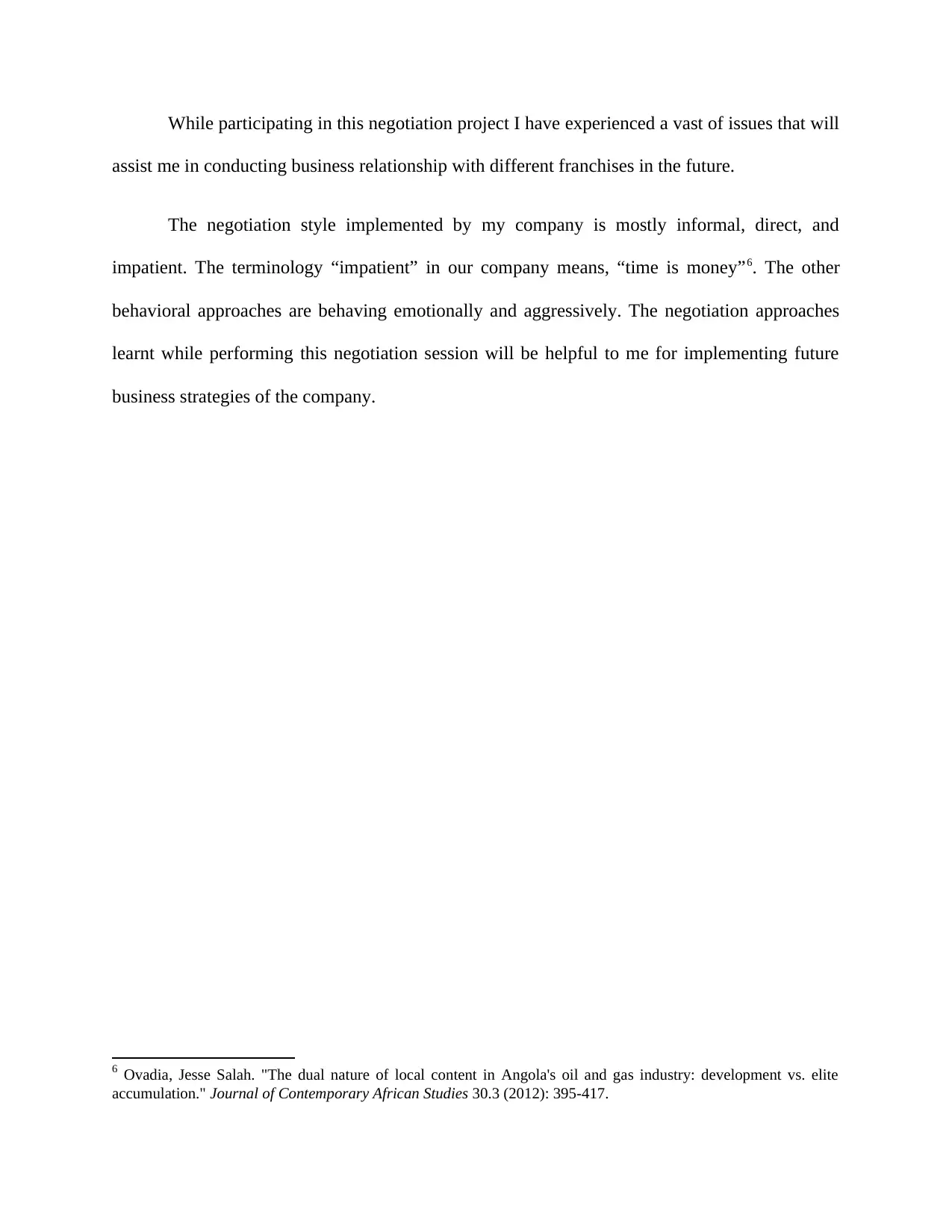
While participating in this negotiation project I have experienced a vast of issues that will
assist me in conducting business relationship with different franchises in the future.
The negotiation style implemented by my company is mostly informal, direct, and
impatient. The terminology “impatient” in our company means, “time is money”6. The other
behavioral approaches are behaving emotionally and aggressively. The negotiation approaches
learnt while performing this negotiation session will be helpful to me for implementing future
business strategies of the company.
6 Ovadia, Jesse Salah. "The dual nature of local content in Angola's oil and gas industry: development vs. elite
accumulation." Journal of Contemporary African Studies 30.3 (2012): 395-417.
assist me in conducting business relationship with different franchises in the future.
The negotiation style implemented by my company is mostly informal, direct, and
impatient. The terminology “impatient” in our company means, “time is money”6. The other
behavioral approaches are behaving emotionally and aggressively. The negotiation approaches
learnt while performing this negotiation session will be helpful to me for implementing future
business strategies of the company.
6 Ovadia, Jesse Salah. "The dual nature of local content in Angola's oil and gas industry: development vs. elite
accumulation." Journal of Contemporary African Studies 30.3 (2012): 395-417.
Paraphrase This Document
Need a fresh take? Get an instant paraphrase of this document with our AI Paraphraser
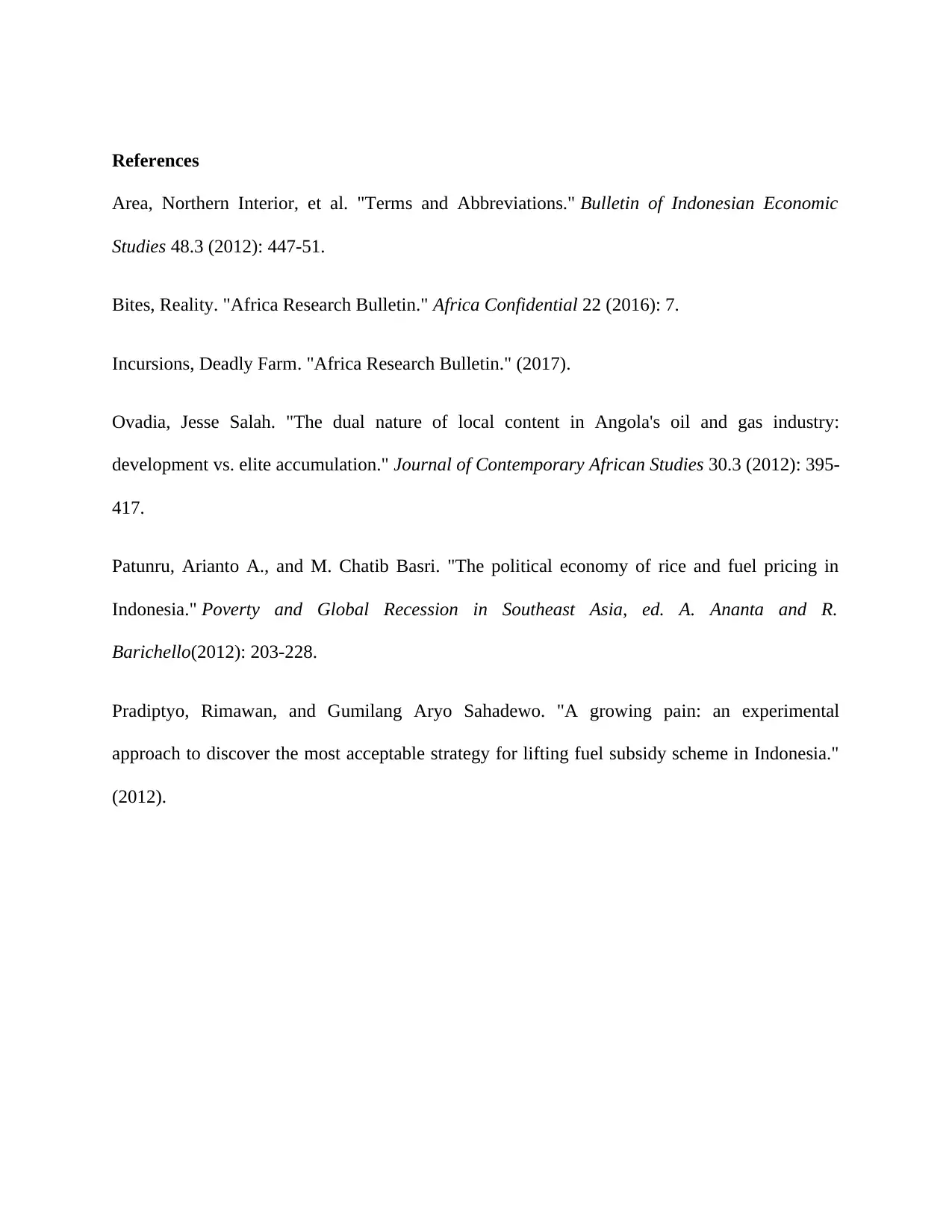
References
Area, Northern Interior, et al. "Terms and Abbreviations." Bulletin of Indonesian Economic
Studies 48.3 (2012): 447-51.
Bites, Reality. "Africa Research Bulletin." Africa Confidential 22 (2016): 7.
Incursions, Deadly Farm. "Africa Research Bulletin." (2017).
Ovadia, Jesse Salah. "The dual nature of local content in Angola's oil and gas industry:
development vs. elite accumulation." Journal of Contemporary African Studies 30.3 (2012): 395-
417.
Patunru, Arianto A., and M. Chatib Basri. "The political economy of rice and fuel pricing in
Indonesia." Poverty and Global Recession in Southeast Asia, ed. A. Ananta and R.
Barichello(2012): 203-228.
Pradiptyo, Rimawan, and Gumilang Aryo Sahadewo. "A growing pain: an experimental
approach to discover the most acceptable strategy for lifting fuel subsidy scheme in Indonesia."
(2012).
Area, Northern Interior, et al. "Terms and Abbreviations." Bulletin of Indonesian Economic
Studies 48.3 (2012): 447-51.
Bites, Reality. "Africa Research Bulletin." Africa Confidential 22 (2016): 7.
Incursions, Deadly Farm. "Africa Research Bulletin." (2017).
Ovadia, Jesse Salah. "The dual nature of local content in Angola's oil and gas industry:
development vs. elite accumulation." Journal of Contemporary African Studies 30.3 (2012): 395-
417.
Patunru, Arianto A., and M. Chatib Basri. "The political economy of rice and fuel pricing in
Indonesia." Poverty and Global Recession in Southeast Asia, ed. A. Ananta and R.
Barichello(2012): 203-228.
Pradiptyo, Rimawan, and Gumilang Aryo Sahadewo. "A growing pain: an experimental
approach to discover the most acceptable strategy for lifting fuel subsidy scheme in Indonesia."
(2012).
1 out of 5
Related Documents
Your All-in-One AI-Powered Toolkit for Academic Success.
+13062052269
info@desklib.com
Available 24*7 on WhatsApp / Email
![[object Object]](/_next/static/media/star-bottom.7253800d.svg)
Unlock your academic potential
Copyright © 2020–2026 A2Z Services. All Rights Reserved. Developed and managed by ZUCOL.





